Fisheries New Zealand has approved the use of a new innovative trawl technology for commercial operations in some deep water fisheries – the Precision Seafood Harvesting Modular Harvest System (MHS).
According to Stuart Anderson, director of fisheries management at Fisheries New Zealand, MHS is the first innovative trawl technology to be approved under amendments to the commercial fishing regulations introduced last year.
The regulations were amended to support innovations in trawl gear that provide opportunities to achieve better quality of catch, add value across the sector, and ensure the sustainable use of fisheries resources.
‘In approving the MHS, Fisheries New Zealand is satisfied the MHS met the criteria of performing at least as well as a traditional mesh trawl net in the hoki, hake, and ling fisheries in providing for sustainable use of our fisheries resources. The performance of the MHS was tested in trials over the last six years in deep water and middle-depth fisheries,’ he said.
The application also sought approval for alfonsino and silver warehou. Approval was not given for these species because there was insufficient information to conclude at this stage that the MHS performed at least as well as a traditional mesh trawl net.
‘Vessel operators are now able to use the gear commercially under the conditions specified in the approval, including: only when targeting hoki, hake, and ling, within area and depth restrictions, and certification and reporting conditions,’ he added.
Fisheries New Zealand will monitor the use of the MHS to ensure compliance with the terms and conditions, and to ensure environmental impacts from the MHS are no more than from traditional commercial trawling.
The Precision Seafood Harvesting industry partners hold special permits to trial the MHS outside of the approval restrictions as part of a research and development programme – for example, to gain further information on its performance in respect to other fish stocks.
‘An application for approval to use the MHS for inshore fisheries has also been lodged, which Fisheries New Zealand is now assessing,’ Stuart Anderson said.
Ministry for Primary Industries (MPI) deputy director-general sector partnerships and programmes, Justine Gilliland says the MHS was developed by the Precision Seafood Harvesting Primary Growth Partnership (PGP) programme.
‘Precision Seafood Harvesting is a $48 million, seven-year PGP programme between MPI and industry partners Moana New Zealand, Sealord Group and Sanford Limited,’ she said.
‘It aims to assist fishing vessels to target specific species and sizes of fish, and enable crews to bring the fish on board better condition. This could improve both the value of a catch and the sustainability of New Zealand’s fisheries. A huge amount of effort has gone into validating and commercialising the technology.’
MPI is investing $24 million over the life of the programme, matched by the industry partners.
‘Approval of the MHS is an exciting step towards making this technology a commercial reality, and towards getting the gains in sustainability and delivering higher value seafood. There will also be benefits generated from the increased research capability, collaboration between 3 of New Zealand’s largest fishery companies, and through the manufacture of the new MHS technology in New Zealand,’ Justine Gilliland said.









